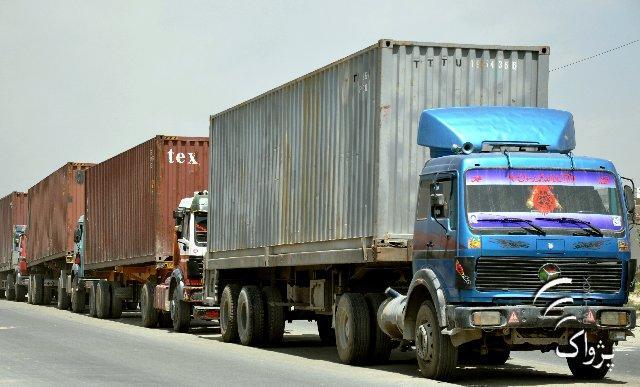KABUL,IMCP) Afghan exporters have defrauded the government of millions of dollars in income tax over the last four years. An investigation by the Independent Media Consortium Productions (IMCP) reveals a massive undervaluing of export figures by the private sector.
The investigation was conducted on the basis of information provided by the Chamber of Commerce & Industry (CCI), traders, and exporters. While the office of the Export Promotion Agency of Afghanistan (EPA) reports total exports last year were 410 million USD, IMC’s own independent calculations show the figure was more likely to be 1.5 milliard USD (1 milliard is equal to 1,000 million or 1 billion.)
When presented with the results of the IMC investigation Najla Habibyar, head of EPA, agrees the value of goods was higher than what was reported. “The figures that we get from both the CCI and customs are not real figures from the point of view of monetary value,” she acknowledges.
Habibyar’s own projections of exports on the basis of reports received from importing countries in Europe, central and south Asia, and the US, was more than 1.5 milliard USD. Her figure was, however, challenged by Mirzaman Popal, in charge of exports development in the CCI. He said Afghan exports were only likely to touch 800 million USD annually if smuggling across the border was stopped.
Manipulating figures
Hajji Mohammad Hassan, head of the Afghanistan Exporters’ Association told IMC traders kept their real earnings hidden in order to keep their taxable incomes low. This is also because exporters were idle for four months every year during the mandatory annual renewal of export licences.
Exporters have cleverly used a government order that sought to encourage exports between 2005 and 2007 by exempting them from paying income tax. Afghan companies were not required to file balance sheets during these three years. But they were to resume showing their profits and losses from 2008.
Hassan said traders had been transparent about export figures for three years (from 2005 to 2007) when exports were tax exempt.
Habibyar blames the CCI for indirectly encouraging exporters to show low figures. “Exporters write their exports less on the Chamber’s Form A so they sell their products at prices that can compete in the international market,” she says.
Fazal Ahmad Joya, a lecturer in the Economics Faculty of Kabul University, too thinks the CCI is indirectly conniving with the private sector. “Unfortunately the Chamber of Commerce blindly defends the private sector; they always get bribes (in return),” he strongly alleges. The ICC “never” criticises the “mafia” that is entrenched in the private sector, he claims. No details were given.
Since taxes are a revenue source for the creation of more investment opportunities, “the Chamber of Commerce should not support the illegal work of the exporters,” Joya argues. Support, he feels, can be extended through “legal ways”.
Passing the buck
Khan Jan Alokozai, first vice-chairman of ICC, came out in defence of the Chamber’s reputation. He said the ICC was not to blame for the undervalued figures since the Exporters’ Association specified all prices. The ICC merely “confirms” the figures already “confirmed by the trader and Exporters’ Association”, he told IMC.
He admits the ICC is wrong in approving the “unreal (export) figures”. But taking a pot shot at the government’s policy of taxing exporters, he described it as “plunder”. “No country taxes exports,” he insists.
He says the ICC has been pressing exporters to increase the value of exports, and it has met with some success. Exports on paper increased by 40 percent in the first quarter of this year compared to last year.
Still this is not good enough. IMC’s scrutiny of the records show the value of export figures was still 79 percent lower than the original price, and exporters have only paid a fifth of what they should pay as income tax.
Administrative corruption
Again the ICC has an argument in defence of exporters. He says they not only have to pay 20 percent of income as tax but also face the problems of administrative corruption and red tape in both customs offices and mustofiats (provincial revenue offices).
Habibyar pins the blame on exporters, and says the fact that they undervalue exports encourages administrative corruption. Customs officials know the goods are undervalued, and use it as a lever to extract money from exporters, she says.
Najibullah Manali, senior adviser in the Ministry of Finance, admits to administrative corruption with a counter argument. “Corruption involves two sides: one who gives the money and the other who takes it. Responsibility is not one-sided.”
He shoots down a plea from both the Export Promotion Agency and ICC for income tax rates to be halved. “We cannot change the law as our friends want,” he says. The government needs to raise money to “stand on its foot”. Exporters get all kinds of support from the government, and pay nothing apart from income tax.
(*) Independent Media Consortium is a joint initiative of Pajhwok Afghan News, The Killid Group (radio and print media), Saba Media Organisation (Saba TV-Radio Nawa nets) and Hasht-e-Subh. This is the fifth of a series of investigative reports on corruption and human rights cases.
Visits: 4









GET IN TOUCH
NEWSLETTER
SUGGEST A STORY
PAJHWOK MOBILE APP